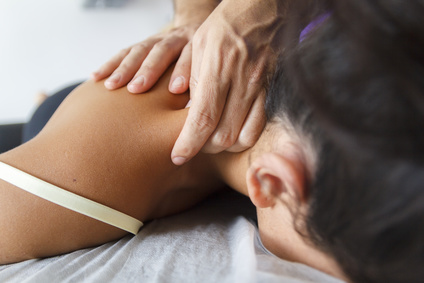
22 Mar Sports Massage…it’s not just for Sports People!
Many people consider sports and remedial massage to only be of benefit to athletes. Whilst it does have many uses for helping with sporting performance, sports massage has also been proven as an excellent aid to health and wellbeing, and a useful tool within the treatment of general aches and pains caused by lifestyle or occupational factors.
Not only is it a great tool for helping to treat and alleviate symptoms and causes of pain, but sports massage is also excellent for helping to maintain a healthy body and for helping to prevent stresses on the body developing into chronic problems.
Sports Massage – Sporting Benefits:
Within Training – Everyone from professional to casual athletes likes to push their bodies beyond normal conditions in order to try to reach ‘peak performance’. Training is the way the body adapts to become fitter and stronger, but it can also come with some unwanted side effects, the main one being increased muscle tension. This can restrict blood flow and in turn restrict oxygen and nutrients needed for the healthy recovery of tissues. It can also put extra pressure on muscle attachment sites and tendon junctions, as well as interfering with nerve feedback mechanisms, which are needed to help develop good technique and ensure efficient control of movement.
Sports massage plays a very useful part in the recovery process. The impact it has on the circulatory system can help to influence the delivery of nutrients and oxygen to the muscles and also create more efficient waste removal from the muscles. This can help speed up recovery times which for the athlete can mean a quicker return to effective training. Reducing excessive tension and normalising tone in the muscles can minimise the risk of injury and maintain desired performance levels. Regular massage allows the body to function with less restriction and accelerates recovery.
Massage can also help to identify possible problems before any symptoms are felt and before the athlete is aware of them. Finding certain soft tissues under stress could be an early warning sign of structural or functional problems, that could lead to more serious injury. Receiving treatment in the early stages of such problems could prevent more serious implications.
Pre-event – In the days before an event, massage helps to relax over tired and over used muscles. It can be useful for getting the sportsperson in the right frame of mind as well as helping with any last minute niggles. Hours before an event, if massage is on offer it is usually a more vigorous and fast paced technique which can help warm up and stimulate the muscles ready for performance.
Post Event – The aim of sports massage at this point is to help the body recover after a particularly strenuous period and help return it to a level of normality. Massage and gentle stretching of the tissues is excellent for reducing the build up of muscle tension as well as helping increase venous return to the heart and lymphatic flow which both play an important part in recovery.
Injury Rehabilitation – Whilst it is always advisable to get injuries treated by a physiotherapist, sports massage can also play a very useful part in the recovery of minor to moderate injuries. Treatment of a minor injury can help prevent it from becoming a more chronic problem. Appropriate application of massage can help with the management of the pain, it can re-align scar tissue fibers and prevent excessive scar tissue formation. Also, by helping to improve circulation, massage brings fresh oxygenated blood to the area, which aids recovery.
Another great benefit is that sports massage can help release excessive muscle tension to the rest of the body where other muscles may be compensating for the injury and taking on extra load or pressure, thus helping to prevent any secondary problems.
Sports Massage – General Benefits for Everyone:
Remedy for General Pain and Dysfunction – However we use or abuse our bodies, our muscles will adapt to help keep us moving and functioning for as long as possible, but over time this places excessive strain on the body and this is when we start to experience specific aches and pains. Pain and dysfunction can be caused by a variety of occupational, lifestyle, postural and emotional factors amongst others. Sports massage can help to treat muscle imbalances and problems occurring from over use of certain muscles. It can help restore elasticity, help increase collagen production and help reverse short-term postural effects. Working on dysfunctional muscles can also help relieve problems around the joints, which can help restore function and normal ranges of motion, and relieve pain.
Psychological and Emotional Benefits – The relaxing element and hands on approach to massage can help calm the body and mind, promote wellbeing, reduce stress and help with the psychological element of pain management and rehabilitation.
Stress can have an impact on the body both mentally and physically. The body reacts to real or perceived stress and it can lead to problems with posture, headaches/migraines, breathing, heart rates and metabolic rates. Under chronic stress it can lead to high blood pressure, pain, cardiovascular disease, digestive problems, depression of varying levels and can often lead people to find unhealthy coping mechanisms.
The nurturing and relaxing element to sports and remedial massage can have a positive impact on the effects of stress on the body as it is believed to stimulate the parasympathetic branch of the Autonomic Nervous System. This works to return the body to homeostasis by slowing down the heart rate and respiration, which in turn induces relaxation, promotes better body awareness and better sleep
If you have any queries about how Sports and Remedial Massage can help you, Andrea Ramus at Halo is always happy to chat through treatment options and how she may be able to help. Please contact Andrea on 07766 117 026 or by emailing andrearamustherapy@gmail.com

Blog compiled by Andrea Ramus, Sports Massage Therapist, Halo Physio



No Comments